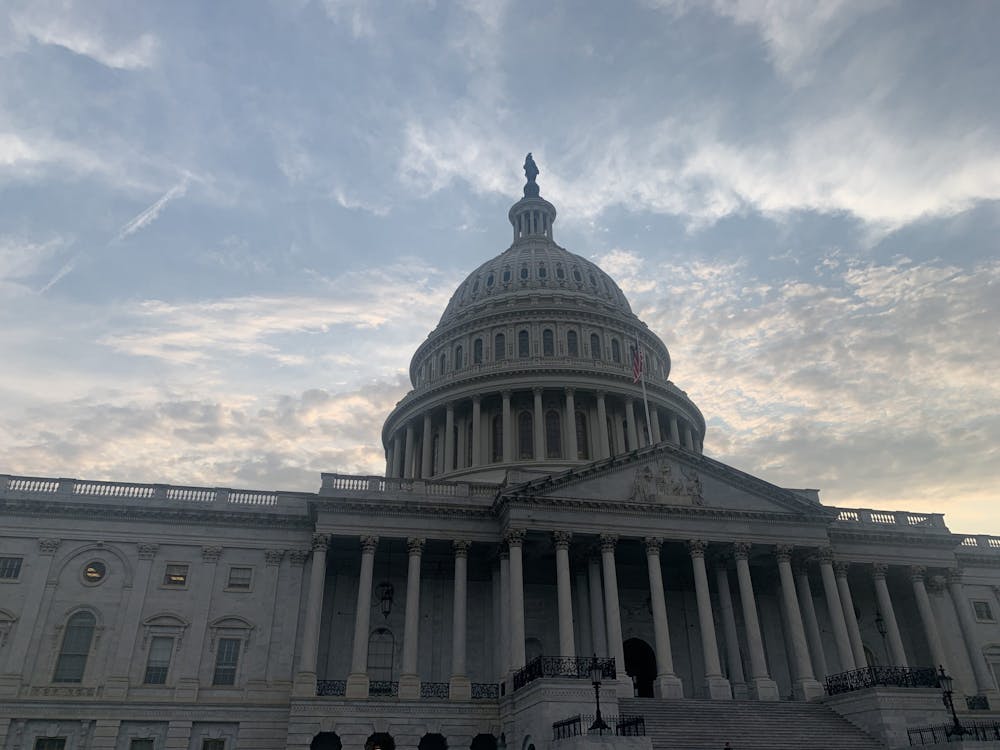On May 2, Politico published a leaked draft majority opinion for Dobbs v. Jackson Women’s Health Organization written by Justice Samuel Alito ’72. The opinion would overturn Roe v. Wade, eliminate national legal protection for abortion, and restore reproductive rights to the states.
As the nation grapples with the fallout of the leak, The Daily Princetonian spoke with professors in the history and politics departments and the School of Public and International Affairs (SPIA), as well as alumni serving in Congress, about their opinions on the draft leak. Views of alumni currently serving in the U.S. Congress fell generally along party lines, with Democrats opposing the overturning of Roe v. Wade and Republicans supporting it. History professors at the University who spoke to the ‘Prince’ expressed concern about the potential decision.
Professors advocate for reproductive rights
For history lecturer Melissa Reynolds, who recently wrote that the reasoning in Alito’s opinion draft read as absurd and ahistorical, reflected on how the initial news of the leak came as a shock.
“Supreme Court experts [and] legal experts for several months had sort of assumed that we would see an opinion overturning Roe v. Wade,” Reynolds said in an interview with the ‘Prince.’ “[However,] it’s shocking that the leak happened at all.” (She previously served as a faculty columnist for the ‘Prince.’)
As a historian who focuses on pre-modern reproductive history and as a specialist in the history of early modern England, Reynolds found the historical precedent Alito cited to be inaccurate.
“The premise of Alito’s draft opinion right now is that this historical precedent was an egregious decision that goes against what was a long established precedent, both in Common Law and American Law in which abortion was unlawful,” Reynolds said. “At every stage, that is not true and that precedent is not correct.”
“Abortion was not unlawful at every stage. The original decision in Roe v. Wade gets the history more correct,” Reynolds added.
Stanley Katz, a professor emeritus in SPIA, emphasized that the draft is a “very radical act” that is “likely to damage the Court,” in an interview with the ‘Prince.’
“It confirms the fears that most well-informed people have, which is, with the Trump majority on the Court, there’s a high probability that Roe would be overturned,” said Katz, a decorated scholar of American legal history. “Although, in my darkest dreams, I would have never imagined an opinion like this.”
Katz explained how citizens need to prepare for a “post-Roe era.”
“I grew up in a pre-Roe era, and I was actively advocating for state laws [in Illinois] that would have made abortion legal,” Katz said. “It looks as though people like me are going to have to start worrying about this again.”

History professor Kevin Kruse said that the impact of the draft opinion can be extended further than only Roe v. Wade.
“[The draft] does suggest that there’s a lot more to come in this direction should the Court strike down Roe and Casey [v. Planned Parenthood], as it seems they will, but a lot of other things on the chopping block, [from] gay marriage to birth control,” Kruse told the ‘Prince.’ “There’s a larger willingness on the part of the Court to overturn all kinds of precedent.”
Kruse urged people to get involved in state and local politics.
“One thing people can do if they are upset about this is get more involved, politically speaking,” said Kruse, an expert on 20th century America. “Not just in terms of voting at the national level [for] presidents and senators who can have a say on Supreme Court justices, but really get involved in state politics.”
“We live in an era in which people are constantly telling folks not to get alarmed, because certainly it won’t go to this extreme, and we keep going to the extremes,” he added. “There’s a lot to worry about, and I don’t think that people are overreacting.”
History professor Laura Edwards, who focuses on the history of women in the law, explained how Roe v. Wade does not establish the right to an abortion, but is based on the right to privacy in an interview with the ‘Prince.’
“What we’re seeing is the reassertion of the notion that states have the right to regulate women’s bodies,” Edwards said. “That has always been a real problem, because [it] essentially says that women do not have bodily integrity that they can control themselves.”
“[The draft opinion] puts states in conflict with each other in ways that I think is going to have incredible ramifications,” Edwards added.
SPIA lecturer Lynda Dodd further discussed how abortion rights have played into the broader conversation on reproductive justice.
“Reproductive justice is a concept used to describe a broader, less litigation-centered agenda that Black feminists have developed and organized around for decades,” Dodd wrote. “These leaders have emphasized that ‘pro-choice’ arguments and the constitutional privacy doctrine do very little for marginalized people who do not have access to birth control options, affordable health insurance, or reproductive health care services.”
Dodd said she believes advocates for gender-equality and reproductive justice likely have a long fight ahead of them. She encouraged citizens to “call for real gender equality. Support and empower the most marginalized in the U.S. and around the world.”
“This goes beyond partisan politics or constitutional law,” Dodd added. “For me, this is about what loving your neighbor should inspire and what promoting life should mean.”
Politics professor Robert P. George and University of Notre Dame law professor John Finnis filed an amicus curiae brief in Dobbs v. Jackson Women's Health Organization that is cited in the draft. George did not respond to repeated requests for comment.
Politics professor Keith Whittington, another expert on American constitutional law, declined a request for comment.
Alumni in Congress express different views in light of leaked draft
In an email to the ‘Prince,’ Rep. John Sarbanes ’84 (D-Md.) called the potential overturning of Roe v. Wade a “dangerous attack on women’s health.”
“If the Supreme Court overturns Roe v. Wade, its decision would end nearly 50 years of precedent guaranteeing the constitutional right to abortion,” he wrote.
“This would be a dangerous attack on women’s health despite broad public support for affordable, accessible abortion care. I will continue to fight for passage of the Women’s Health Protection Act to codify abortion rights for all Americans regardless of where they live,” he added.
A spokesperson for Rep. Terri Sewell ’86 (D-Al.) directed the ‘Prince’ to the public statement Sewell made after news of the draft opinion was first released.
“The draft opinion by the Supreme Court is a devastating blow to women’s reproductive rights. A woman’s personal health care decisions should be made between her and her doctor,” Sewell said in the statement. “The Senate must pass the Women’s Health Protection Act so that women everywhere can access a full range of reproductive health care services.”
Alumni Republicans in Congress, meanwhile, celebrated the likely decision. Sen. Ted Cruz ’92 (R-Tx.) commended the Alito draft.
“Sen. Cruz has said that if the Supreme Court overturns Roe v. Wade, it is nothing short of a massive victory for life and will save the lives of millions of innocent babies,” the spokesperson wrote in an email to the ‘Prince.’
The spokesperson for Cruz expressed the Senator’s anger over the opinion leak.
“Sen. Cruz believes the leak is an unprecedented breach of the trust that every clerk, justice, and employee of the Supreme Court owes to the institution,” they wrote. “It’s impossible to overstate the gravity of this ethical, and possible legal, violation. The wound to the independence and integrity of the Court may well be one from which the Court never fully recovers.”
On May 11, Cruz voted against the Women’s Health Protection Act, which would enshrine abortion access in federal law.
“Sen. Cruz has said that if the Supreme Court decides to overturn Roe, it won’t mean abortion will be illegal. It will mean that people all across the country get a say in what their state’s abortion policy will be, which is how our democratic process should work,” the spokesperson wrote.
Rep. Ken Buck ’81 (R-Co.) called the leak “a very serious attack on the judicial process” in an email to the ‘Prince’. He also expressed his hope that the Supreme Court would overturn the case as the draft opinion appears poised to do.
“Roe v. Wade was a mistake,” he wrote. “The Supreme Court tried to legislate on a difficult moral issue to unify the country and failed miserably. The draft opinion is a victory for mothers, babies, and federalism. We are very close to a day when the power to decide this vital moral question will be where it belongs: with the people.”
In his email, Buck also stressed his opposition to abortion rights.
“It is barbaric to deny that an unborn baby with ten toes, ten fingers, a beating heart, a pain capable central nervous system and a viable life outside of the womb is not entitled to the basic human right to live,” he added. “Laws regarding reproductive rights for all Americans must be applied to protect the life of the mother and the unborn child.”
In an email to the ‘Prince,’ Rep. Raja Krishnamoorthi ’95 (D-Il.) said that Roe v. Wade is a “fundamental pillar of reproductive freedom as well as personal liberty.”
“Through this ruling, Justice Alito, with the apparent backing of four other justices, would be demolishing an entire body of vital law while citing legal precedents which appear to demonstrate his sheer contempt for the rights of women,” he wrote. “I find this ruling indefensible in legal or human terms.”
Krishnamoorthi encouraged those upset about the potential overturning of Roe to engage in political activism.
“That’s why this is also a political call to arms for everyone who cares about the right to choose, the rights of women, or individual rights more broadly as this may only be the beginning [of] the court’s radical Constitutional revisionism,” he wrote. “The only way to counter that is for all those who support the right to choose to fight for it at the local, state, and federal levels.”
Sen. Jeff Merkley GS ’82 (D-Or.) and Rep. Mike Gallagher ’06 (R-Wi.) did not respond to a request for comment.
Lia Opperman is an assistant news editor who often covers University affairs, student life, and local news. She can be reached at liaopperman@princeton.edu, on Instagram @liamariaaaa, or on Twitter @oppermanlia.
Naomi Hess is a news editor emerita who focuses on University policy and alumni affairs. She can be reached at nihess@princeton.edu or on Twitter at @NaomiHess17.








